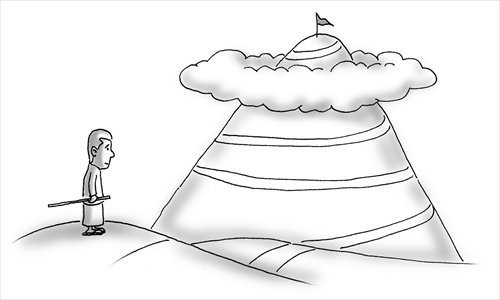HOME >> OP-ED
Retreat of junta means greater future stability for Myanmar
By Ding Gang Source:Global Times Published: 2015-11-11 23:33:01

Illustration: Liu Rui/GT
The general elections in Myanmar on Sunday attracted worldwide attention. Based on early data collated from polling stations across the country, Aung San Suu Kyi's opposition National League for Democracy (NLD) has won.
This is an important step in the country's democratic process. In 2010, Myanmar started parliamentary elections after decades of military rule. Although the military still holds a compulsory 25 percent of seats in parliament, the rise of the opposition is inevitable.
The changes of public opinions brought about by the election system and an open social environment that brews the condition for oppositions are beyond the rulers' control. A political system is often composed of many elements that are not easily changed, and once changed, they may bring severe setback and chaos that the ruling class will find it hard to bear.
However, like its close neighbor Thailand, Myanmar has spent many years under military rule. The military group's control over the country's politics, economy and society cannot be easily shaken.
Anything that proceeds without the military's permission may end up in failure. Even if members of the NLD can form the cabinet or even become the president, they still need to keep a stable relationship with the military.
In a long-term perspective, the military's overall control over politics and economy does no good to Myanmar's development over time and does not benefit social stability and ethnic reconciliation.
The military departing the political stage has become inevitable and is a basic precondition for Myanmar to return to the international community. Awareness of this pushed the military leadership to carry forward parliamentary elections.
Usually, only a government that is both authoritative and determined and is able to unify its people can lead a developing country like Myanmar to realize rapid economic development. But given the current social and ethnic conditions in Myanmar, such a government is unlikely to emerge. The conflicts among the military, religious and different ethnic groups need far more solutions than simply an electoral system.
The key for the NLD to share power is utilizing politics to make military groups gradually give up their overall control of the country's politics and economy without generating any fierce political confrontation or social chaos.
If the military can truly respect the election results and adopt a cooperative approach with the NLD, the country can be hopeful of building up the foundation of the rule of law necessary for economic development.
Since Myanmar embarked on its democratic path, it has seen growing but still relatively small foreign investment.
In 2012, it only attracted $1.4 billion in foreign investment, $3.6 billion in 2013, and $8.1 billion in 2015. Enterprises from Europe and the US have been hesitant, and the main investors remain those from Asian countries such as Singapore, South Korea, Thailand, Japan and China.
There are complicated reasons that foreign capital is cautious about entering Myanmar.
The US has not fully lifted its economic sanctions on the country. Domestically, productivity is poor and the legal system is incomplete. Moreover, the military takes control of the economy.
Chinese companies have slowed down their investments in Myanmar, largely because of the unstable policies of Myanmese authorities. More and more Chinese enterprises have realized that an economy controlled by a military government bears high risks for investment.
Myanmar is changing. This is generally beneficial to the country's political and economic development. Only a stable Myanmar can enjoy more benefits from China's development.
The author is a senior editor with People's Daily. He is now stationed in Brazil. dinggang@globaltimes.com.cn. Follow him on Twitter at @dinggangchina
Posted in: